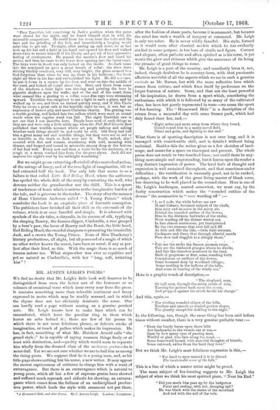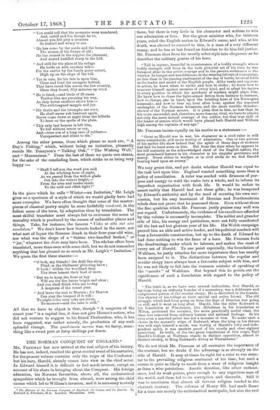MR. AUSTEN LEIGH'S POEMS.*
WE feel no doubt that Mr. Leigh's little book well deserves to be distinguished from even the better sort of the fourscore or so volumes of occasional verse which issue every year from the press. It contains something more than tolerable sentiment and fancy expressed in metre which may be readily scanned, and in which the rhyme does not too obviously dominate the sense. One ean hardly read a page without coming on a genuine poetical note. Mr. Leigh knows how to make lines which can be remembered, which have the peculiar ring in them which leaves an echo behind it ; there are few of his poems in which there is not some felicitous phrase, or delicate stroke of imagination, or touch of pathos which makes its impression. He has, in fact, something of what Mr. Matthew Arnold calls "the grand style ;" he is capable of saying common things finely or at least with distinction, and—quality which would seem to separate kim wholly from the doomed class of the niediocres puetae—he is aever dull. Yet we are not sure whether we are to hail him as among the rising poets. We suppose that he is a young man, and, as his title-page shows nothing but his name, a new writer. It may appear the merest captiousness of criticism to charge him with a want of extravagance. But there is an extravagance which is natural to young poets, which all but a few of supreme genius have showed and suffered much reproach and ridicule for showing, an extrava- gance which comes from the fullness of an undisciplined produc- tive power, which loads the style with ornament not put there, *A Homeward Ride, and other Poem,. By C. Austen Leigh. London; Longmans.
after the fashion of sham poets, because it is ornament, but because the mind has such a wealth of imagery at command. Mr. Leigh is only too sober. He is never wildly fanciful. His style, formed as it would seem after classical models which be has evidently studied to some purpose, is too bare of simile and figure. Correct and elegant, often pathetic and often spirited as is his verse, it yet wants the glow and richness which give the assurance of its being the promise of great things to come.
Mr. Leigh is a poet of the country, and manifestly loves it, not, indeed, though doubtless he is country-born, with that passionate affection watchful of all the aspects which we see in such a genuine ruricola as Mr. Barnes, but with the more reflective love which comes from culture, and which fixes itself by preference on the larger features of nature. Some, and that not the least powerful of his inspiration, he draws from a sport which, considering the enthusiasm with which it is followed by so many of the cultivated class, has been but poorly represented in verse—we mean the sport of fox-limiting. The "Homeward Ride" is a description of the
return from a successful day with some Sussex pack, which had duly found their fox, and,— "Eight miles and more away from where they found, Closed round him in a many-acred field, Silent and grim, and fighting to the end."
What there is of sporting description is not over long, and it is managed with considerable skill, and is detailed without being technical. Besides this the writer gives us a few sketches of land- scape, and muses for a space on times past and present. The whole poem does not reach to two hundred lines ; nor could there be any- thing more simple and unpretending, but it leaves upon the reader a very distinct impression of power. The level both of thought and expression is well sustained throughout, and that sometimes under difficulties ; the versification is unusually good, not to be ranked, perhaps, with the work of the great living master of blank verse, but deserving to be well placed in the second class. Here is one of
Mr. Leigh's landscapes, marred somewhat, we must say, by the faulty construction which makes the "rounded outline of the downs" the nominative to "were warding off" :— "I, as I rode, the while before me saw
Aunt Coburn, foremost outpost of the chalk, Rise near and massive in the misty air.
Behind the rounded outline of the downs, Blue in the distance, bulwarks of the realm, Were warding off the distant wintry sea, In line almost continuous, yet transpierced By the two streams that ever fall and fill As falls and fills the tide, —twin tidal streams, Cuckmere and Ouse, that through alluvial meads Pass slow and sluggish to a shingly shore."
"Fair are the crofts the Sussex yeoman reaps, Fair are the timbered granges where he dwells, And fair the churches scattered in the land, Built of groystone or flint, some standing forth Conspicuous on outliers of the downs, Some bosomed deep by woodland villages, Some nestling in the hollows of the hills, And some in hearing of the windy sea."
Here is a graphic touch of description,— " The shepherd, seen, Or half seen, through the misty scuds of rain, Turning his patient back upon the storm, And propped against his crook beside his charge."
And this, again,— " The circling rounded ridges of the hills, Treeless and smooth as tended garden slopes, The ghostly sheepfolds tinkling to the night."
In the following, too, though the same thing has been said before times without number, there is a very genuine pathetic tone :—
"Even the lonely barns upon these hills Are landmarks to the vessels out at sea,—
Seen by how many eyes of passing men, Wistful or glad, who fare along the coast,— Some homeward bound, with cheerful thoughts of friends, Some outward, exiles from the land they love!"
But we think Mr. Leigh's most felicitous expression is this,— " For hard to eyes unused it is to thread The inextricable eiTor of the hills."
This is a line of which a master artist might be proud.
The same subject of fox-hunting suggests to Mr. Leigh the subject of what we think his most spirited piece, "Near his End."
"Did you mark hits pass up by the hedgerow Faint and reeling, with low, drooping tail? He was black with the stains of the moorland And red with the soil of the vale. "You could tell that his moments were numbered, And, caitiff and fox though he be, Almost you felt pity a creature So hunted and weary to see.
"He has come by the yards and the homesteads, The scenes of his forays of old ; Ho has roused in the coppice the pheasant, And scared huddled sheep in the fold.
"And still for the place of his refuge He holds on with resolute will—
For the earths by the lonely gorse covert, High up on the slope of the hill.
"Yet in vain, for his fate is upon him, Close and loud the avengers behind, That have raced him across the low country, Since they found, fifty minutes up wind.
"He is fated,—and birds of ill-omen Traitor-like are pursuing his way, As they hover exultant above him— The evil-tongued magpie and jay.
"His thefts and his triumphs are over, He shall never rob henroost again, Never come down at night from the hillside To feast on the spoils of the plain.
"This only last honour is left him, To fall without terror or cry,
And—true son of a long race of robbers—
Unrepentant and silent to die."
Among the other poems, those which please us most are, "A Day's Fishing," which, without being an imitation, pleasantly recalls Mr. Tennyson's "Talking Oak," "The Wishing Well," and " Manumissus." From the last of these we quote one stanza, for the sake of the concluding lines, which strike us as being very happy
:- "Shall I tell you the word you said At the witching hour of night, As we passed from the willow glade Out into the waters bright,— From the true and tender shade To the cold and elfish light ?"
In the piece which he calls "Winter—an Imitation," Mr. Leigh gives us a specimen of a style of which we would gladly have had more examples. We have often thought that some of the master- pieces of classical poetry might be more faithfully rendered, in the fullest sense of the term, by adaptation than by translation. The most skilful translator must always fail to overcome the sense of unreality which is produced by the names of unfamiliar places and things. Take, for instance, the famous " Vides at alta stet nive candidum." We don't know how Soracte looked in the snow, nor what sort of liquor the Romans drank in their four-year-old wine, nor what was the shape of a "Sabine two-handled beaker," or "jar," whatever the diota may have been. The ode has often been translated, more than once with some skill, but we do not remember anything that has pleased us so much as Mx. Leigh's "Imitation." We quote the first three stanzas :— " 0 look, my friends ! the drift lies steep Piled on the Chilterns' glittering brow ; 0 hark ! within the woodland deep The trees lament their load of snow.
"But we to keep the frost at bay Will see the fire burns bright and clear ; And you shall drink with me to-day A magnum of the comet year.
"And leave the rest to Heaven ; for Heaven Can stay the tempest if it will ; To-night—the very oaks are riven, To-morrow—and the lake is still."
All that we have to object is that, though "A magnum of the comet year" is a capital line, it does not give Horace's notion, who did not venture to suggest to his friend Thaliarchus, who, it has been suggested, was rather miserly, the production of any such splendid vintage. The quadrintunt merunt was, we fancy, some- thing like a sweet port at forty shillings per dozen.



































 Previous page
Previous page